
Andrew Keen is one of the world’s best known and most controversial commentators on the digital revolution.
He is the author of three books: “Cult of the Amateur,” “Digital Vertigo,” and his current international hit “The Internet Is Not The Answer,” which the London Sunday Times acclaimed as a “powerful, frightening read,” and the Washington Post called “an enormously useful primer for those of us concerned that online life isn’t as shiny as our digital avatars would like us to believe.”
He is executive director of the Silicon Valley innovation salon FutureCast, the host of the popular Internet chat show “Keen On,” a Senior Fellow at CALinnovates, a columnist for CNN, and a much acclaimed public speaker around the world. In 2015, he was named by GQ magazine in their list of the 100 Most Connected Men.
Written Articles
View All Business
Business
KeenON: CEA’s Gary Shapiro on the Digital Revolution in 2015
There are few more optimistic thinkers than Gary Shapiro, the CEO and president of the Consumer Electronics Association and the author of "Ninja Innovation: The Ten Killer Strategies of the World’s Most Successful Companies." Shapiro–who is also the guy behind the annual Consumer Electronics Show in Las Vegas–believes 2015 might be the year the digital revolution reaches its tipping point and truly starts to change the world. New technologies as varied as 3D printing, drones, self-driving cars, and networked clothing, Shapiro thinks, are going to solve many of our most entrenched problems.
By Andrew Keen
Feb 23, 2015 Business
Business
KeenON: SAP’s Bill McDermott Seeks Startup Mentality in the Corner Office
As the CEO of the business software giant SAP, Bill McDermott is self-evidently a winner. But it wasn’t also that way. Born into a humble Long Island family, McDermott is a self-made man whose journey from corner store to corner office is chronicled in his new book "Winners Dream." So is that journey from underdog to top dog still possible in today’s world? Yes, McDermott says.
By Andrew Keen
Jan 30, 2015 Andrew Keen
Andrew Keen
KeenON: Coca-Cola’s CTO on How Social Drives Customer Service
So is Coca-Cola a tech company? Of course not, most people would say. But as the company’s Senior Vice President and Chief Technical Officer Guy Wollaert confessed, the future will be shaped by today’s new technologies, especially digital technology. That’s why Wollaert both attended and spoke at the Techonomy 2014 conference in Half Moon Bay. And that’s why Coca-Cola has invested in a series of innovation initatives called the Co-Founder Network, in which the company makes investments in promising start-ups.
By Andrew Keen
Jan 16, 2015 Andrew Keen
Andrew Keen
KeenON: Venture Capitalist and Higher Ed Entrepreneur Tim Draper
With his trademark aplomb, the storied venture capitalist Tim Draper is revolutionizing higher education. His new Draper University of Heroes, a Silicon Valley-based startup college, is turning traditional education on its head. Instead of history, students learn the future. Instead of conventional economics, they learn about Bitcoin. And instead of success, they are taught how to fail.
By Andrew Keen
Dec 17, 2014 Barton Gellman
Barton Gellman
KeenON: Journalist and NSA Expert Barton Gellman
It isn’t surprising that Edward Snowden chose then Washington Post reporter Barton Gellman as one of the earliest recipients of his leaked NSA documents. Gellman is the author of a best-selling book about Dick Cheney as well as many influential articles about the war on terror, and thus was a natural choice for Snowden when he sought a trustworthy journalist to publicize the PRISM materials. So was Snowden a hero? Not surprisingly, Gellman won’t be drawn into such a clichéd analysis.
By Andrew Keen
Dec 11, 2014 Digital Transformation
Digital Transformation
KeenON: The New Yorker’s James Surowiecki on the Digital Future
There are few journalists both more reasonable and more insightful than The New Yorker’s James Surowiecki. At Techonomy 2014 in Half Moon Bay last month, Surowiecki moderated the fascinating “Can Tech Bring Equality and Peace?” panel, which included Jack Dorsey and Intel’s Genevieve Bell. So it was a real honor to have the opportunity to sit down with Surowiecki and pick his brain about the future of innovation, the Internet, and even death itself.
By Andrew Keen
Dec 2, 2014 Andrew Keen
Andrew Keen
KeenON: A Conversation with International Rescue Committee CEO David Miliband
David Miliband, best known as the Miliband sibling who lost the British Labour party to his brother Ed, has a new job. Miliband is now the CEO of the International Rescue Committee (IRC), the New York City based organization dedicated to helping victims of war, disease, and natural disasters. Unfortunately, the IRC is in much demand. “We serve 15 million people each year,” Miliband dryly told me when we caught up at Techonomy 2014 in Half Moon Bay, Calif., where he also spoke on a panel with Jack Dorsey about the impact of technology on morality.
By Andrew Keen
Nov 19, 2014 Facebook
Facebook
KeenON: Five Conversations with Walter Isaacson
The central message of "The Innovators" is that collaboration is king. Partnerships, Walter Isaacson explains, are the at the core of every great enterprise—from Ada Lovelace and Charles Babbage’s invention of the computer to Larry and Sergei’s invention of Google. But what are the keys to being a good innovator? Are twosomes better than threesomes? Can companies—Facebook, for example, be founded by a single individual? And what, according to Isaacson, did Steve Jobs consider his great innovation?
By Andrew Keen
Nov 5, 2014 Albert Einstein
Albert Einstein
KeenON: “Innovators” Author Walter Isaacson
Walter Isaacson, the biographer of great men like Ben Franklin, Albert Einstein, and Steve Jobs, has now turned to the history of the digital revolution. But rather than the story of genius, Isaacson’s "The Innovators: How a Group of Hackers, Geniuses, and Geeks Created the Digital Revolution," is actually a narrative of collaboration between talented people. Beginning with the remarkable relationship between Charles Babbage and Ida Lovelace in the middle of the 19th century, Isaacson sees the story of the digital revolution in terms of collaboration.
By Andrew Keen
Nov 5, 2014 Arts + Culture
Arts + Culture
I Saw It on YouTube (So It Must Be True)
If it happened on YouTube, then must it be true? That was the intriguing observation of one attendee, the writer on digital life Sarah Granger, at a recent FutureCast event dedicated to online filmmaking. Granger believes that YouTube has replaced Google as the “gold standard” of truth—especially for digital natives who’ve never known any other media except the Internet. For some, the idea of YouTube representing the gold standard for truth is more than a bit worrying.
By Andrew Keen
May 19, 2014 Andrew Keen
Andrew Keen
Video Is Eating the World
Marc Andreessen famously said that software is eating the world. But the real online glutton may be video. Mark Nagel, the executive director of marketing for AT&T’s Foundry innovation centers, told the crowd at a recent FutureCast event about online filmmaking that video content is expected to grow 60% annually over the next few years. AT&T expects video to be 75% of its total network traffic by 2017. So does this eruption of online video represent an economic bonanza for filmmakers?
By Andrew Keen
May 16, 2014 Andrew Keen
Andrew Keen
The Intimacy and Authenticity of Online Filmmaking
The idea that the Internet has democratized moviemaking has become one of the most repeated truisms of the digital age. But what, exactly, does the ability of everyone to post video on popular networks like YouTube, Daily Motion, and Vimeo mean to the filmmaker herself? According to the noted filmmaker Tiffany Shlain, it means that the art of intimacy and authenticity become central to the creative product. "I think there is an intimacy with the way people are experiencing it," Shlain said about online filmmaking at a recent Ericsson and AT&T hosted FutureCast. The event helped launch her latest short movie, "The Science of Character."
By Andrew Keen
May 12, 2014 Andrew Keen
Andrew Keen
Will Movies Move to the Cloud?
The idea of cloud computing these days is, of course, hardly radical. But noted film maker Tiffany Shlain has a notion of what she calls "cloud filmmaking" that is considerably different than what people typically mean when they say "cloud." For her, making movies in the cloud means curating the self-made content (usually selfies) of others to produce her own work. But isn't that crowd-sourced movie making? Not according to Shlain. "I don't like the idea of crowd sourcing.... I get nervous in crowds." Shlain told "Digital Vertigo" author Andrew Keen at a recent Ericsson and AT&T hosted FutureCast event to launch her latest short movie, "The Science of Character."
By Andrew Keen
May 9, 2014 Andrew Keen
Andrew Keen
Are the Smart Machines Taking Over?
At CES this year, all the talk was about smart machines: smart cars, smart glasses, and, of course, smartphones. But should we be scared of these smart machines? Are they about to become too smart—so smart, indeed, that they are calling the shots? This was one of the most interesting audience questions at a keynote panel I moderated featuring Ericsson CEO Hans Vestberg, Qualcomm CEO Dr. Paul Jacobs and AT&T’s SVP of Network Operations John Donovan. Interestingly enough, the panelists seemed less afraid of our networked future than the audience.
By Andrew Keen
Mar 20, 2014 Andrew Keen
Andrew Keen
Spectrum, Spectrum, Spectrum: The Three Key Issues in The Future of Mobile Technology
At CES this year, I moderated a keynote panel featuring Ericsson CEO Hans Vestberg, Qualcomm CEO Dr. Paul Jacobs, and AT&T’s SVP of Network Operations John Donovan. And the CES audience was pretty impressive too—including such luminaries as FCC Commissioner Jessica Rosenworcel. After the formal discussion, Rosenworcel was the first to ask the panelists a question. “Do we have enough spectrum for mobile commercial use?” she asked. “And if we don’t, how can technologies like small cells help us use it more efficiently?” “Spectrum is the life blood of the industry” Donovan said, and “the oxygen for commerce.”
By Andrew Keen
Mar 18, 2014 Andrew Keen
Andrew Keen
What Is the Future of Our Networked Society?
Today, the smartphone is ubiquitous. But as the Internet of Things becomes more and more of a reality, what is the future of the phone? And, in the not too distant future, will it be replaced as our central operating device by such intelligent networked objects as smart clothing, smart glasses, and smart cars? At CES this year, I moderated a keynote panel featuring Ericsson CEO Hans Vestberg, Qualcomm CEO Dr. Paul Jacobs and AT&T’s SVP of Network Operations John Donovan. And each of them spoke about their vision of a networked world in ten years time.
By Andrew Keen
Mar 13, 2014 Andrew Keen
Andrew Keen
Is Mobile Dead?
Is mobile redundant? No, not the technology. But has word “mobile” become redundant? After all, mobile is so ubiquitous these days that it seems as if everything we talk about in tech—from apps to devices to the networks themselves—is inevitably “mobile.” And who better to ask about the ubiquity of mobile technology than the CEOs of Ericsson and Qualcomm and the SVP of Network Operations at AT&T. I had the great fortune at CES this year to moderate a keynote panel featuring Hans Vestberg of Ericsson, Dr. Paul Jacobs of Qualcomm and John Donovan of AT&T. And this was the first question that I asked this all-star panel.
By Andrew Keen
Mar 6, 2014 AT&T
AT&T
Obama: From Bottom-Up Candidate to Top-Down President
Like so many of us, California's Lieutenant Governor, Gavin Newsom was inspired by Barack Obama's Internet-driven 2008 Presidential campaign. Indeed, Newsom was so inspired by a campaign run by "35,000 self-organizing communities" that he wrote a book called "Citizenville," which sees all change as beginning from the bottom up. But Newsom has fallen out of love with Barack Obama. As he told me at our latest Ericsson and AT&T hosted FutureCast event at the AT&T Foundry in Palo Alto, the "bottom-up candidate" has turned into the "top-down President." Obama isn't the Internet President, Newsom insists. By transitioning from change.gov to whitehouse.gov, he's let his Internet base down.
By Andrew Keen
Feb 12, 2014 Andrew Keen
Andrew Keen
Could Privacy Become a New Form of Currency?
It's becoming increasingly clear that the latest digital technology is killing privacy. As Robert Scoble said at our latest Ericsson and AT&T hosted FutureCast event at the AT&T Foundry in Palo Alto, the future will be dominated by surveillance technologies like sensors, wearable computing, and location data. So, I asked California's Lieutenant Governor, Gavin Newsom what, exactly, does the end of privacy mean from the perspective of a politician? Newsom was refreshingly blunt. "We never had it," he replied. "So it's like welcome to my world."
By Andrew Keen
Feb 6, 2014 AT&T
AT&T
Can the Internet Make Politics More Collaborative?
So what is politics? Is it something we do once every couple of years—electing politicians who then are supposed to do stuff for us? Or is it a collaborative space, what the ancient Greeks called a "polis," where citizens go to improve their community? According to California Lieutenant Governor Gavin Newsom, we need to change our politics from what he calls a "referendum process" to something more collaborative. More polis, less petition, Newsom says. And that's where the Internet comes in.
By Andrew Keen
Feb 4, 2014 Andrew Keen
Andrew Keen
Should Politicians Be More Like Silicon Valley Entrepreneurs?
Should all politicians have to launch a startup before entering politics? That’s the question I asked California’s Lieutenant Governor, Gavin Newsom, at the latest Ericsson and AT&T hosted FutureCast event held at the AT&T Foundry in Palo Alto. Newsom, the author of "Citizenville," a kind of digital manifesto for 21st century networked politics, didn’t beat around the bush. “Yes," Newsom replied, sounding more like a startup guy than a career politician.
By Andrew Keen
Jan 21, 2014 Andrew Keen
Andrew Keen
Why Do People Still Come to Silicon Valley?
The traffic is terrible, the real-estate ridiculously expensive, the public schools aren’t that great and the gulf between rich and poor is increasingly pronounced. So why do people still come to Silicon Valley? That’s the question we asked participants at a recent Ericsson and AT&T Foundry hosted FutureCast event that focused on innovation in Silicon Valley. The answers from our international audience were varied, instructive and entertaining.
By Andrew Keen
Jan 1, 2014 Andrew Keen
Andrew Keen
Can Silicon Valley Survive?
Silicon Valley hasn’t had one of its best years. There are more and more complaints about inequality, discrimination against women and minorities, lack of innovation and a focus on short-term economic gain. The Valley, veterans say, isn’t what it used to be. And, they go on, if Silicon Valley is to survive, it has to reinvent itself in an increasingly competitive global economy where most of the rest of the world is trying to emulate the Valley. So, I asked David Kirkpatrick, when I interviewed him at an Ericsson and AT&T Foundry hosted FutureCast event that focused on the future of innovation, how exactly can Silicon Valley reinvent itself?
By Andrew Keen
Dec 31, 2013 Andrew Keen
Andrew Keen
Are the Best and Brightest Still Coming to Silicon Valley?
Are the smartest entrepreneurs and technologists still attracted to Silicon Valley? Does the Valley still pull in the best and brightest from around the world? According to David Kirkpatrick, who I interviewed at an Ericsson and AT&T Foundry hosted FutureCast event, the answer may well be no. Kirkpatrick tells the story of a remarkably talented Chinese guy he met in Beijing recently who had read his book, “The Facebook Effect,” five times. “I was just amazed I stumbled across that in Beijing,” he told me. This guy, Kirkpatrick explained, was running a 20-person Beijing startup just focused on making Facebook games.
By Andrew Keen
Dec 27, 2013 Andrew Keen
Andrew Keen
Is Silicon Valley the Center of the Innovation Universe?
Silicon Valley takes it for granted that it’s the center of the innovation universe. But that, of course, is a weakness—which points to the often parochial and inward looking nature of many Silicon Valley entrepreneurs and investors. So is Silicon Valley really the center of the innovation universe? That’s the question we asked an invitation-only crowd who came to the AT&T Foundry in Palo Alto to hear me interview David Kirkpatrick at the Ericsson and AT&T hosted FutureCast event.
By Andrew Keen
Dec 27, 2013Videos
View AllBy Andrew Keen
Nov 23, 2022 China
China
Ian Bremmer and Andrew Keen on Understanding the Global Mess
A top analyst of geopolitics, covering Russia, Europe, Hong Kong, US-China relations, tech’s role to bring the world closer or further apart, the geography of innovation, and…do we have a future?
By Andrew Keen
Jul 17, 2020Andrew Keen and David Kirkpatrick on the Future of the Internet and Global Tech Platforms
We’re in a dangerous interrelated global cycle of tech dysfunction, social discord, political polarization, policy failure, and climate catastrophe. Can the world get a grip on tech? How do we reset and restore?
By Andrew Keen
Nov 25, 2019What Connected Mobility Really Means
Session Description: New agile entrants are pushing the boundaries of how tomorrow’s cars will run (on their own), what they’ll do (everything), and what they’ll be (an iPhone with wheels?) From cars and buses to bikes and trains and everything in between, people and businesses need to be able to move. What does the intelligently […]
By Andrew Keen
Sep 20, 2015Tech and the Organization of Work
Session Description: How is technology and digitization reshaping the fundamental organization of work? What does it mean to be white or blue collar? Will computers replace us or will we find new ways to work alongside them, in what’s starting to be called “assistive intelligence”? How do we update policies and re-visit organizational models that […]
By Andrew Keen
Sep 20, 2015Confronting the Internet Counter-Reaction
Keen: Thank you all for coming. The subject today—and I don’t think you can have a counter-reaction. A reaction is counter by definition. So anyway, that’s—so maybe we’ll have to cancel that. But we’re still going to do this. And I thought we would start—we’ll try to keep it as informal as we possibly can, […]
By Andrew Keen
Dec 18, 2014“The Internet Is Not the Answer”
Keen: Nice to be here. So I’ll try to be not too much of a curmudgeon, but I can’t resist a little bit. And I appreciate what Jaron was saying about the danger of being a curmudgeon in this world. I want to talk a little bit about curmudgeoness. But David Marcus revealed that everyone, […]
By Andrew Keen
Nov 11, 2014Andrew Keen: The Internet Is Not the Answer
Andrew Keen, Internet entrepreneur and author of several books about technology including "Digital Vergito" and, most recently, "The Internet Is Not the Answer," spoke at our Sept. 16 Techonomy Detroit conference about his belief that tech companies seek profits under the misleading guise of doing social good.
By Andrew Keen
Sep 23, 2014Andrew Yang et al: Startups, Cities, and Innovation
The ideas are flowing fast, as is the money. Young (and old) the world over are increasingly drawn to entrepreneurship, and inventive tech solutions are emerging everywhere. Is “Silicon Valley” a spirit rather than a place? What makes a city attractive for company incubation? Is this energy likely to continue, or will cities like Detroit have trouble sustaining it? Will the successful companies of the future stay put or move elsewhere? In this session from our Sept. 16 Techonomy Detroit conference, angel investor Jill Ford, Josh Linkner of Detroit Venture Partners, VegasTechFund's Andy White, and Venture for America's Andrew Yang join moderator Andrew Keen examine how cities can grow and retain talent and innovative companies.
By Andrew Keen
Sep 23, 2014The Digital Divide: How Can the Tech Industry Become More Inclusive?
As companies like Twitter, Facebook, Google, and Apple release their hiring data figures, the Twitter-verse explodes with commentary on the lack of diversity in the industry. This is not a new problem, but there should be new solutions. How can tech and American entrepreneurship be more inclusive? Brian Forde of the White House Office of Science and Technology Policy, Google's Chris Genteel, Laura Mather of Unitive, Marlin Page of Sisters Code, and Indiegogo's Danae Ringelmann discuss how to make the tech industry more of a melting pot in this Techonomy Detroit 2014 breakout session, moderated by Andrew Keen of TechCrunch.
By Andrew Keen
Sep 22, 2014 Analytics + Data
Analytics + Data
Is the Internet for or Against You?
The data you generate on- and off-line about what you watch and look at, buy, borrow, even what ails you, is tracked, quantified, packaged and sold. Your virtual self and your reputation are being qualified, commoditized and monetized. The dystopian critique is gaining adherence, from novelists to heads of state worldwide. If someone is making money from this info, shouldn’t you? James Cham of Bloomberg Beta, Accenture's Dan Elron, Reputation.com's Michael Fertik, Andrew Keen of Digital Vertigo, and shopkick's Cyriac Roeding discuss. Watch video and read the complete transcript here.
By Andrew Keen
Nov 12, 2013Events
View All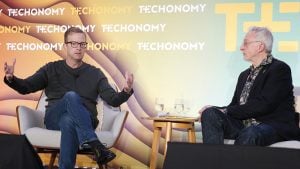 Conferences
Conferences
Techonomy 22
Innovation and technology have the power to save us – if we act rapidly in multiple realms. We face daunting dilemmas – the climate crisis, war, a continuing global pandemic, refugees, and gyrating economies. But there is hope.
By Andrew Keen
Apr 6, 2022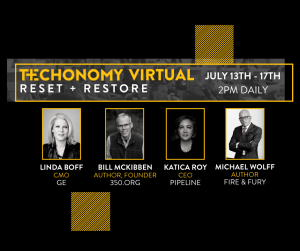 Conferences
Conferences
Techonomy Virtual: Reset + Restore
The combination of the Covid-19 crisis and the heightened awareness of racial injustice is unprecedented. This is a historic moment in so many ways and our speakers took an in-depth look at the ongoing transformations in business, technology, social life, ethics, health, and global relations.
By Andrew Keen
Feb 10, 2020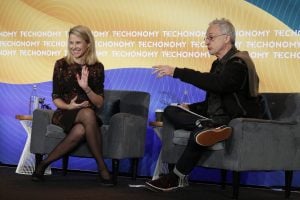 Conferences
Conferences
Techonomy 19
The theme for Techonomy 2019 in Half Moon Bay, California was “Reset and Restore: Governing Tech, Retrieving Ethics, and Acting on Climate.” We are in a unique period when corporate responsibility and big-picture thinking is absolutely essential.
By Andrew Keen
Jan 7, 2020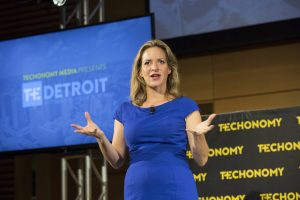 Conferences
Conferences
Detroit 15
The impact of tech on the American economy, its cities and the transformation of the urban ecosystem shaped the agenda for our fourth annual one-day Techonomy Detroit conference.
By Andrew Keen
Sep 15, 2015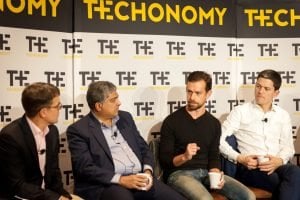 Conferences
Conferences
Techonomy 14
This year Techonomy moves to the beautiful Ritz-Carlton Half Moon Bay, November 9-11, on the cliffs south of San Francisco, near Silicon Valley.
By Andrew Keen
Nov 7, 2014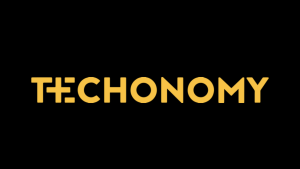 Conferences
Conferences
Detroit 14
On September 16th, Techonomy returns to Detroit for our third annual Techonomy Detroit conference. We will continue the series of conversations we began at our first Techonomy Detroit in 2012 on how technology can boost U.S. economic growth, job creation and urban revival.
By Andrew Keen
Sep 15, 2014 Conferences
Conferences
Techonomy 13
A new society is coming into being. People around the world are building it using the rapidly-evolving tools of technology.
By Andrew Keen
Nov 11, 2013 Conferences
Conferences
Techonomy 11
Techonomy is about the centrality of technology to business and social progress and the urgency of embracing the rapid pace of change brought by technology. Every major issue going forward will be affected by how it intersects with tech innovation. We believe that only those leaders who keep this conviction at the forefront of their […]
By Andrew Keen
Nov 11, 2011 Speakers & Participants
Speakers & Participants
Techonomy 19 – Speakers & Participants
The theme for Techonomy 2019 in Half Moon Bay, California was “Reset and Restore: Governing Tech, Retrieving Ethics, and Acting on Climate.” We are in a unique period when corporate responsibility and big-picture thinking is absolutely essential.
By Andrew Keen
Jan 7, 2010Newsletter Subscriptions
Sign up for our newsletters
"*" indicates required fields

